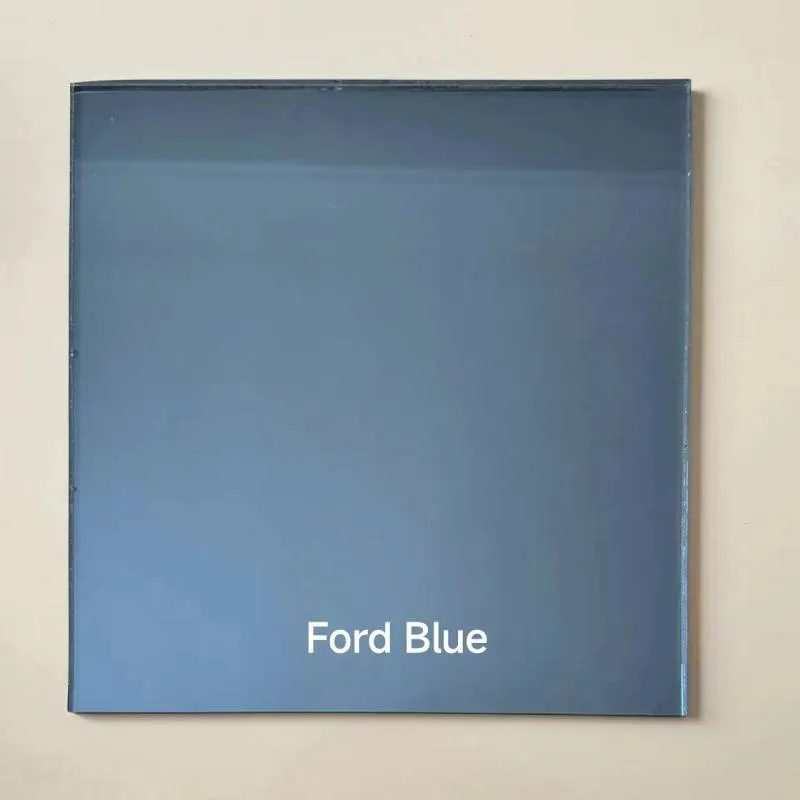

In contemporary architecture and design, tinted glass has become a popular and practical choice for those seeking to combine beauty with performance. Offering privacy, UV protection, and aesthetic appeal, tinted glass is widely used in residential, commercial, and automotive applications. From skyscraper facades to interior partitions and sunrooms, its ability to reduce glare and enhance energy efficiency makes it an essential material for smart design.

One of the primary reasons architects and homeowners turn to tinted glass is its excellent privacy-enhancing capability. Depending on the darkness and color of the tint, different types of tinted glass provide varying levels of visual shielding. Lighter tints such as bronze or gray offer subtle privacy, while deeper tones, like blue tinted glass, can significantly obstruct the view from outside while still allowing ample natural light inside.
This makes tinted glass an optimal choice for meeting rooms, private balconies, office partitions, and living spaces that require seclusion without the need for heavy curtains or blinds. Unlike frosted or mirrored alternatives, tinted glass offers a more natural look and softens harsh lighting conditions without completely obscuring visibility.
Moreover, when used in double-glazed or laminated formats, tinted glass enhances sound insulation and further elevates privacy by minimizing indoor visibility and outside noise penetration simultaneously.
Apart from enhancing privacy, one of the most celebrated features of tinted glass is its ability to block harmful ultraviolet (UV) rays. Quality types of tinted glass can filter out up to 99% of UV radiation, depending on the thickness and chemical composition of the tint. This not only protects interiors from sun-induced fading—extending the life of furniture, artwork, and flooring—but also safeguards human skin against prolonged exposure to UV rays.
For commercial buildings with large glass facades or car interiors exposed to direct sunlight, tinted glass becomes an indispensable asset. UV filtering helps maintain interior temperature, reduces glare on electronic screens, and promotes a more comfortable living or working environment without relying on heavy sun-blocking accessories.
Buyers seeking reliable UV protection often choose blue tinted glass, which has proven to be particularly effective in reflecting both visible and ultraviolet radiation while maintaining visual clarity.
With the increasing popularity of indoor gardens, sunrooms, and greenhouses, many are curious about whether tinted glass hinders plant development. The answer largely depends on the types of tinted glass used and the intensity of the tint. While darker tints may block some of the red and blue wavelengths essential for photosynthesis, lightly tinted glass options still allow sufficient light for healthy plant growth.
In fact, certain applications even benefit from tinted glass, as it helps regulate temperature and prevents scorching of sensitive plants during peak sunlight hours. Designers working on hybrid greenhouses or garden-facing office lobbies often use blue tinted glass to balance aesthetic elegance with adequate lighting for decorative plants.
Additionally, selecting the correct tinted glass for sale that includes spectrally selective coatings can ensure optimal light transmission for both humans and plants.
When considering the tinted glass cost, it’s essential to factor in both immediate expenses and long-term value. While tinted glass might come with a slightly higher upfront cost compared to ordinary float glass, its benefits in energy efficiency, UV blocking, and reduced interior damage translate into significant savings over time.
Property owners who install high-quality tinted glass often experience reduced air conditioning loads, resulting in lower energy bills. Moreover, its durability and minimal maintenance requirements make it a worthwhile investment for long-term use. Leading tinted glass suppliers also provide options with custom coatings and colors, allowing clients to tailor the look and function to their exact architectural needs.
Whether it’s for commercial curtain walls or home patio doors, choosing the right tinted glass for sale is a strategic move toward improved comfort and aesthetic appeal.
Among the wide array of types of tinted glass, blue tinted glass stands out not only for its UV protection but also for its unmatched visual elegance. Its cool tone complements both modern and traditional structures, adding sophistication to facades, skylights, and interiors.
In commercial settings like shopping malls, hotels, or luxury apartments, blue tinted glass is often favored for its ability to reduce glare while making a bold visual statement. It also pairs seamlessly with aluminum, wood, or concrete framing systems, giving designers more freedom to express creativity.
Architects often choose blue tinted glass when they want to deliver a high-end, contemporary look while maintaining functionality, privacy, and comfort. With its strong demand in both commercial and high-end residential construction, it remains one of the most sought-after styles in today’s building materials market.
Tinted glass provides excellent daytime privacy by blocking visibility from the outside. However, at night when interior lights are on, additional coverings like blinds may be needed for complete privacy.
Yes, high-quality tinted glass can block up to 99% of harmful UV radiation, protecting both skin and furnishings from sun damage.
Absolutely. Blue tinted glass is not only visually appealing but also reduces glare and enhances privacy, making it ideal for homes.
Light tinted glass has minimal impact on plant growth. As long as sufficient light transmission is maintained, most plants can thrive behind tinted glass.
Tinted glass cost depends on factors such as thickness, color, size, coating, and whether it is tempered or laminated. Custom orders and coatings will slightly increase pricing but add long-term value.